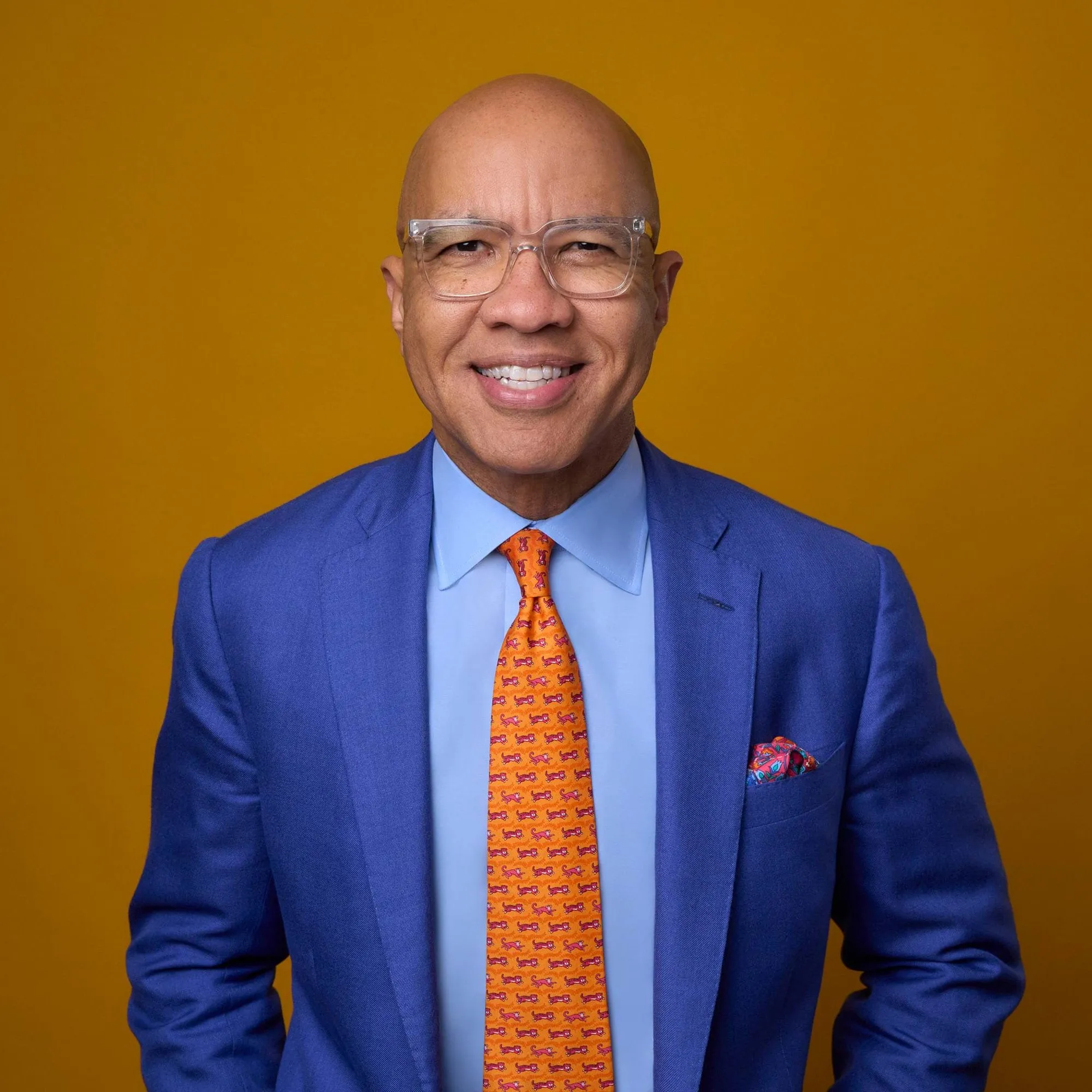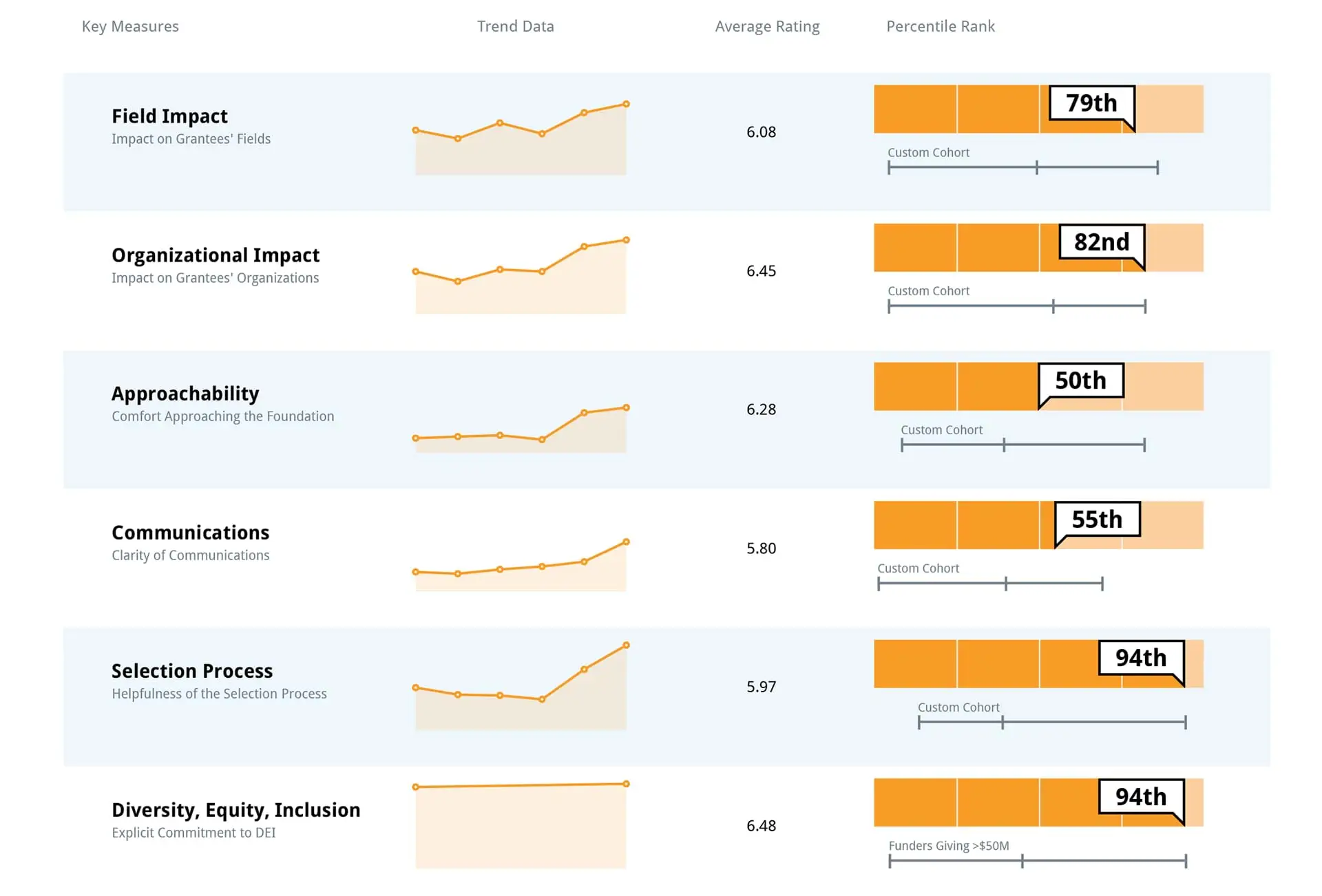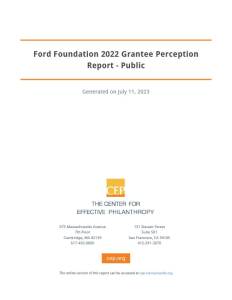Building on Feedback: Results from our Grantee Perception Survey
- Andean Region
- Brazil
- China
- Civic Engagement and Government
- Creativity and Free Expression
- East Africa
- Future of Work(ers)
- Gender, Racial, and Ethnic Justice
- Indonesia
- Mexico and Central America
- Middle East and North Africa
- Mission Investments
- Natural Resources and Climate Change
- Southern Africa
- Technology and Society
- United States
- West Africa
At the Ford Foundation, we are committed to being responsible and responsive grantmakers. As funders, we recognize how uneven the power dynamic is, and how few opportunities there are for us to receive the kind of feedback that can help us improve our relationships to the organizations we support. We know that if we want honest and candid feedback, we need to offer channels for input with an emphasis on anonymity. That’s where the Center for Effective Philanthropy (CEP) comes in.
Since 2008, our CEP colleagues have conducted six surveys of our grantee organizations to assess how we are seen by the partners we support. The findings provide us a sense of how we have improved or declined in key areas over time, as well as how we compare to the over 300 funders who rely on the Grantee Perception Survey. Between 2008 and 2017, we received four surveys that gave us consistent feedback: We had much to improve. But in 2017, we made concerted efforts to take this feedback and apply it.
Among our efforts, we streamlined our grantmaking systems and made significant commitments to multiyear general operating support through our BUILD initiative. These multiple and combined efforts helped lead to significant improvements in our 2020 survey.
In 2022, we conducted another survey and hoped that we were still on the right track. The results were heartening, as we held strong and even saw some additional improvements. This sort of sustained improvement is fairly unusual in the philanthropic field, CEP notes, particularly for a large funder like Ford. While we celebrate the good news, we also hear that there is still room for improvement—and we take this very seriously. We’re pleased to share the top findings of the survey and our plans to address this invaluable feedback.
What we learned

President, Ford Foundation

Executive Vice President of Programs, Ford Foundation
We are on an upward trajectory, with grantees’ perceptions at their highest-ever point on a number of key issues.
The foundation received its highest-ever rating for impact on grantees’ fields and organizations. Ratings also improved for the foundation’s understanding of the social, cultural, and socioeconomic contexts in which organizations work, as well the foundation’s understanding of the needs of the people and communities that they serve. Comments from respondents highlighted our crucial leadership on issues related to their fields and our influence on other funders. They described our funding as “transformational to their organizations and to their ability to make a lasting difference in their fields.”
We were also happy to learn that ratings are at an all-time high for the helpfulness of our selection process. Respondents reported more positive experiences for all aspects of the reporting process, and that they experienced low levels of pressure to modify their priorities in order to receive funding. These significant improvements on our selection process suggest we are on the right track, and we continue to work toward streamlining our processes.
Finally, we were able to build on our past strong ratings in Diversity, Equity, and Inclusion (DEI). Given our commitments in this area, we welcomed hearing that Ford by and large communicates and demonstrates our work in DEI.
Key Ratings Summary

We can improve on our engagement and communication.
Even as we celebrate these strong results, there are places where we see need for improvement, particularly areas where we’ve made little progress over the years, where we lag compared to our peers. The first is our relationships, responsiveness, approachability, and engagement with grantee organizations. While we were able to maintain our gains from 2020 on a number of these measures, some of these results were still lower than we believe they should be. One of the most common suggestions for improvement was more frequent and substantive interactions between Ford staff and those we fund.
And while we improved significantly on the clarity with which we communicate our goals and strategies with grantee organizations, ratings for the consistency of our communications remained largely unchanged. These are still lower than other very large, private funders.
While the findings we share here are about the foundation overall, we also recognize that grantee organizations often have different experiences depending on program and geography. Our goal is to minimize that variability wherever possible so that all organizations we fund consistently have positive experiences.
Finally, while there were no meaningful patterns of differences associated with grantee disability identity or gender, respondents who identify as part of the LGBTQ+ community provided significantly lower ratings across many survey measures. In the United States, respondents who identify as a person of color provided lower ratings on these issues than grantees who do not identify as a person of color. These are places where we want to see change.
Next steps
While we are encouraged by these most recent survey results, and pleased that we’ve seen positive trends since 2020, we’re also ready to roll up our sleeves and work to improve even further.
The survey reminded us that the organizations we fund view Ford as a leader in the philanthropic space and on the global stage, especially in our public commitments to social justice issues and incorporation of DEI initiatives. We will continue these efforts and demonstrate that a vibrant, diverse workforce is a richer one.
We are also looking to make the following commitments:
- Prioritize more substantive conversations between program officers and organizations, and help program staff become more responsive to the organizations they fund
- Include grantee organizations even more explicitly in strategy development wherever possible
- Continue to employ the use of multiyear, general support in our grantmaking and use additional, non-monetary institutional support to grantees where appropriate
- Convene the leaders and organizations we support and connect our grantee organizations to other funders where strategic
- Ensure consistent coverage of indirect costs for eligible project grants by applying our policy of a 25% minimum rate
- Seek ways to create a more consistent and positive experience for grantee organizations, regardless of program or regional area and without disparities based on LGBTQ+ status or race and ethnicity
These survey results are just the beginning of an important discussion. Please reach out to Ford staff if you have additional suggestions or any questions. We appreciate the remarkable organizations in our community and look forward to improving our relationships with them even further.
